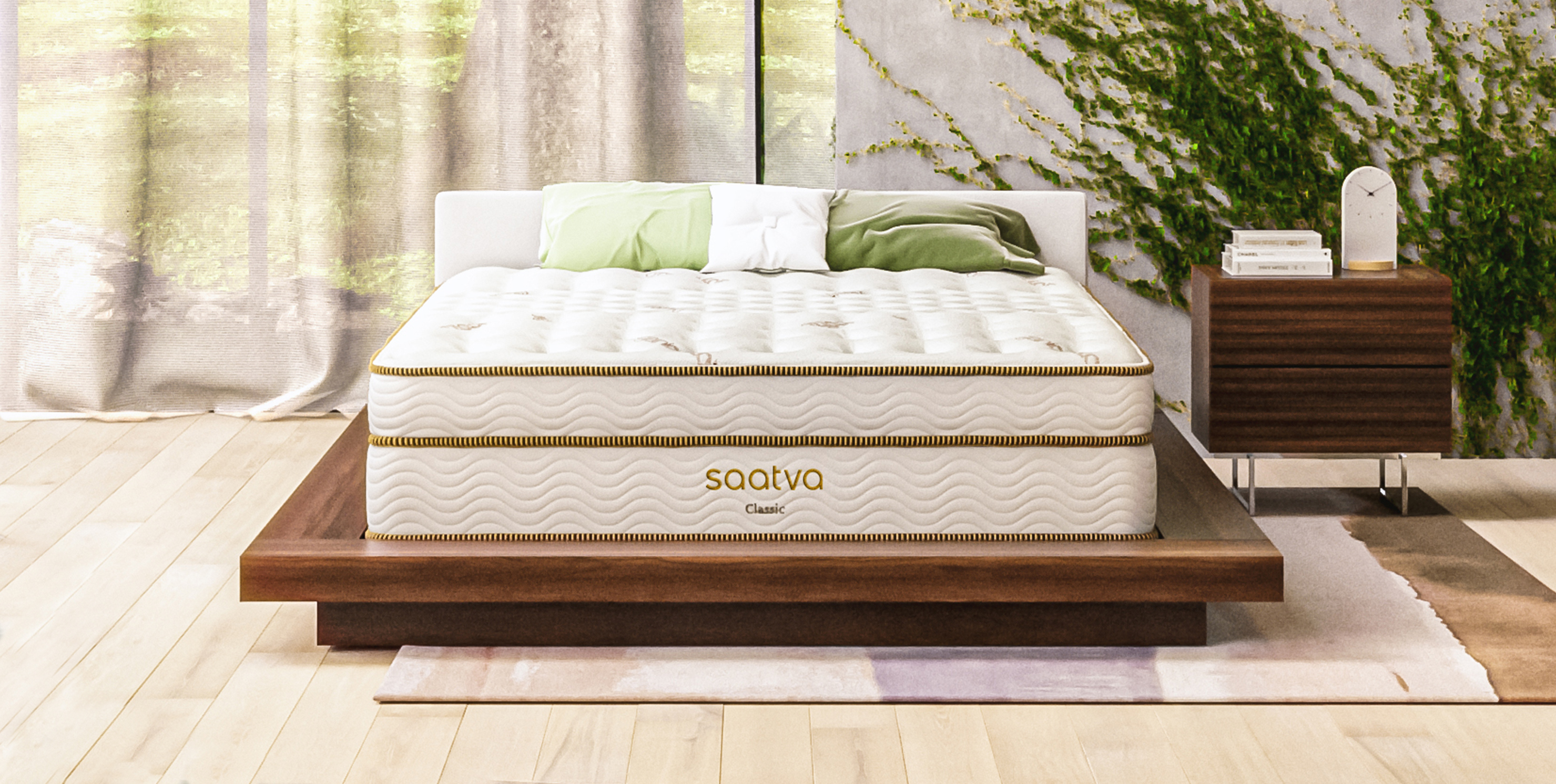
In our medium vs firm mattress comparison, we're looking at the pros and cons of two of the most popular comfort levels available. Firmness is a big decision that you'll need to make when mattress shopping, so it's something you need to get right to ensure you're comfy at night.
The good news is that many of this year's best mattresses for all budgets come in both medium and firm, so you won't be short of options once you've decided which firmness level to go for.
We'll break down the cost, comfort and support you can expect from medium vs firm mattresses, and we'll unpick the pros and cons to help you easily make the right choice for your needs.
Medium vs Firm mattress: Key differences
A medium mattress can mean three different things. A medium mattress, in its purest form, is probably a 5 or 6 out of 10 on the firmness scale (10 being the firmest). However, it can also mean a medium-soft mattress (4/10) and a medium-firm mattress (7/10).
A medium-firm mattress is sometimes called a luxury-firm mattress, and it's a popular mattress in a box firmness option as it can provide universal support and comfort to most kinds of sleepers, and the rating is often recommended to bed-sharing couples with different sleep needs looking for a good compromise.
A firm mattress is usually an 8 out of 10 on the firmness scale. While the majority of the firm mattresses don't go over 8/10, you can get some with a firmness rating of 9 or even 10/10. Some firm beds are dual-sided, meaning one side is 8,9, or 10, while the other side is soft or soft medium (2-4/10) so you can flip it over to the side that feels the most comfortable and supportive to you.
A key difference between a medium vs firm mattress is the material. Many of this year's best hybrid mattresses are firm and the firmer feel usually hinges on the coils or springs used, providing sturdy, bouncy support instead of sink-in softness.
However, there are plenty of hybrid mattresses that fall in the medium or medium-firm category too, thanks to cushioning memory foam being a key ingredient in hybrids to provide extra comfort. The best memory foam mattresses tend to have a medium rating, with only outliers lacking the traditional hug of memory foam tending to have a firm rating.
Medium vs Firm mattress: Brands and prices

Most mattress brands tend to have a wide selection of firm and medium mattresses. In fact, many sleep brands release models with customizable firmness, meaning you can choose a mattress and then select which firmness option you'd like it
While many brands, such as Saatva (pictured above) and Brooklyn Bedding, enable you to adjust the firmness at no extra cost, the pricing of this option can vary from brand to brand will save you extra money too. For example, the standard mattress firmness is medium for brands such as Lucid Mattress and Stearns & Foster, and if you want make it firmer you'll have to pay extra.
On the other hand, Avocado Green Mattress, the signature mattress of eco-luxe sleep brand Avocado Green, has a standard firmness rating of firm, meaning you have to pay extra to make it plusher. See how much you can save with this month's Avocado mattress deals.
Medium vs Firm mattress: Comfort and support
A key difference between medium vs firm mattress is support and comfort, When we think of a five-star luxury hotel bed, we tend to think of a plush, sink-in soft bed, while firm mattresses are considered to be uncomfortable. However, some firm mattresses can help certain sleepers avoid discomfort.
If you sleep on your back or stomach, your hip and lower back region will need the most support as these areas are your pressure points. If a mattress is too soft, your hips will sink or dip into the mattress. When they dip, it can cause your spine to become misaligned which leads to lower back pain.
Firm mattresses, however, keep the hips and body firmly supported and well-aligned. Likewise, heavyweight sleepers will also benefit from firm sturdiness to support their pressure points and weight.
That said, many sleepers will feel feel well-supported on a medium or medium-firm mattress, especially back sleepers. Side sleepers benefit the most from a medium mattress, as they need some softness to cushion their pressure points in the shoulders, hips, and knees. A firm mattress may be uncomfortable for side and lightweight sleepers, as they need sink-in plushness to avoid joint pain.
Medium vs firm mattress: Benefits
While both medium mattress and firm mattresses have their own advantages, they also have some drawbacks. Here are some of the main pros and cons of each kind of mattress firmness:
The pros of a medium mattress:
They're more affordable: Medium is usually the default firmness setting for mattresses, with many of the best cheap mattresses being rated no higher than medium-firm.

They suit most sleepers: Side sleepers fare very well with medium and medium-soft mattresses, while back sleepers are well suited to medium-firm mattresses. They're also great for those who are unsure of their sleep style (such as combination sleepers) and couples with varying sleep needs wo need to find a good compromising mattress.
They're great for back and joint pain: While there was a time when chiropractors would recommend rock-hard beds for those with back and joint pain, now medium-firm mattresses are often recommended for a good balance of comfort and support.
The pros of a firm mattress:
They're supportive: The best mattresses for heavy people tend to be firm or the firmest side of medium. This is because the firmer the mattress, the more shapes and sizes it can support.
They can prevent back pain: As the firm, sleep surface keeps hips upright, weight equally distributed, and spine properly aligned, firm mattresses can prevent lower back pain in stomach, back, and heavyweight sleepers.
They have a bouncy feel: Many firm mattresses are innerspring, hybrid or made from Dunlop latex foam (which is dense and provides bouncy pressure relief), they tend to have a buoyant feel perfect for those who like to change position while they sleep or dislike the traditional body-hugging feel of memory foam.
Medium vs firm mattress: Drawbacks
The cons of a medium mattress:
They can't support all shapes and sizes: If you're a heavyweight sleeper (i.e. you weight over 250lbs), you'll need a bed with sturdy support, and many medium mattresses aren't supportive enough.
They can cause back pain: If you sleep on you're stomach or have a heavy body, a medium mattress can cause you're hips to dip. Sinking hips can lead to your spine becoming misaligned, which can lead to lower back pain.
The feel can vary: As mentioned above, medium mattress can mean mean classic medium (5-6), soft-medium (4) and medium-firm (7). Some medium mattresses will be firm enough for most sleepers, while others are only appropriate for petite or side sleepers.
The cons of a firm mattress:
They're uncomfortable for some sleepers: While some people like a firm, bouncy surface, a lot of sleepers (especially lightweight and side sleepers) need that cushioning pressure relief to sooth their pressure points and joint.

They don't have that body-hug plushness: Firm mattresses can't always provide you with that cloud-like sink-in softness and body-contouring comfort that many sleepers love. In fact, you may find sleeping on a firm mattress is like sleeping on the ground.
They can have weak motion isolation: The softer the mattress, the lower the motion transfer. The buoyancy of a firm mattress may be appealing if you want to move around more easily, but this can often lead to some night-time disturbances if you or your partner is a restless sleeper.
Medium vs firm mattress: Which should you buy?
Buy a medium mattress if…
✅ You want cushioning pressure relief: If you want to soothe your joints and pressure points, and love your bed to be sink-in soft and cloudlike, then a medium mattress can provide the cushioning pressure relief you need.
✅ You're a lightweight or side sleeper: Lightweight and side sleepers need something that feels soft against their hips, shoulders, and knees, and firm mattresses will feel to hard against their pressure points. Medium mattresses, on the other hand, can easily contour to your body's weight and provide body-hugging comfort.
✅ You share a bed: Medium or medium-firm beds can provide a good middle ground for couples who share a bed but have different sleep needs. Plus, medium beds are best at providing motion isolation.
Buy a firm mattress if…
✅ You sleep on your stomach: Firm mattresses keep stomach sleepers' pressure points (i.e. the hips) upright and well-aligned with the spine, preventing lower back pain.
✅ You're plus-sized: A firm, sturdy bed is perfect for those who weigh over 250lbs and need some extra support.
✅ You prefer a bouncy feel: If you find the hug of memory foam or the sink-in softness of a plush bed to be stifling rather than comfortable, then a firm bed can provide buoyancy and ease of movement.







